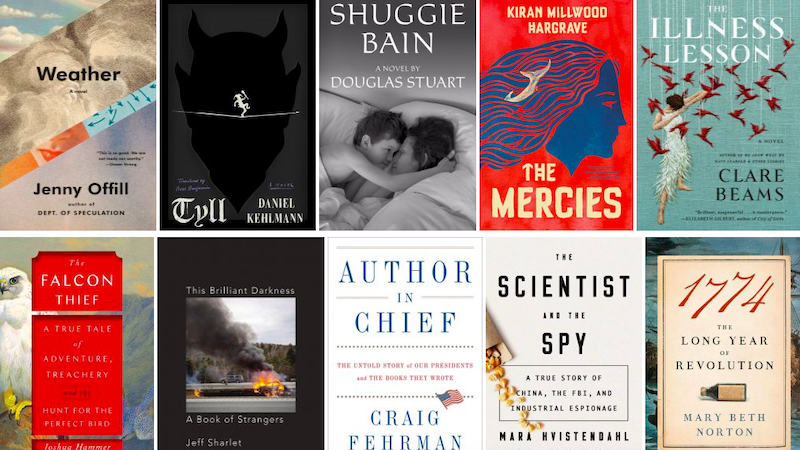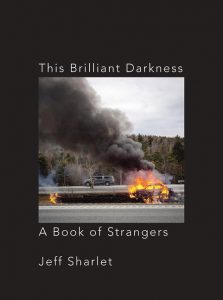
Jenny Offill’s Weather, Daniel Kehlmann’s Tyll, Joshua Hammer’s The Falcon Thief, and Mara Hvistendahl’s The Scientist and the Spy all feature among the Best Reviewed Books of the Week.
1. Weather by Jenny Offill
15 Rave • 7 Positive
“… tiny in size and immense in scope, radically disorienting yet reassuringly humane, strikingly eccentric and completely irresistible … A narrator and a novel that hum with anxiety and pulse with dread are nonetheless hilarious, warm, and lovable. Both ruefully mordant and strangely consoling, Weather is at once brutal in its unsparing honesty and utterly exhilarating in its wit and intelligence. It radiates with the beleaguered yet buoyant optimism, the luminous integrity, of a supple and fearless writer.”
–Pricilla Gilman (The Boston Globe)
Read an interview with Jenny Offill here
2. Tyll by Daniel Kehlmann
7 Rave • 2 Positive
“…a magnificent story of an artist’s transcendence over the petty superstitions, convenient betrayals and widespread brutality of his time … Tyll’s picaresque tale ranges widely over Europe, but Kehlmann juggles his stories with the dexterity of Ulenspiegel himself … Even more gripping are scenes with no wink toward the history books … Kehlmann is a master of economical, devastating description … Equally chilling are his descriptions of a society in which old kindnesses are forgotten under pressure, where truth matters less than the ability to terrify people into confession, where lies scribbled in Latin become history … In this exquisitely crafted novel, Kehlmann moves just as nimbly through the grimmest of human experiences. The result is a spellbinding memorial to the nameless souls lost in Europe’s vicious past, whose whispers are best heard in fables.”
–Irina Dumitrescu (The New York Times Book Review)
3. Shuggie Bain by Douglas Stuart
5 Rave • 4 Positive
“The way Irvine Welsh’s Trainspotting carved a permanent place in our heads and hearts for the junkies of late-1980s Edinburgh, the language, imagery, and story of fashion designer Stuart’s debut novel apotheosizes the life of the Bain family of Glasgow … In indelible, patiently crafted vignettes covering the next 11 years of their lives, we watch what happens to Shuggie and his family. Stuart evokes the experience of each character with unbelievable compassion … You will never forget Shuggie Bain. Scene by scene, this book is a masterpiece.”
Read Douglas Stuart on poverty, anxiety, and gender in Scottish working-class literature here
4. The Mercies by Kiran Millwood Hargrave
2 Rave • 7 Positive • 1 Mixed
“The novel delights not with surprise, but by pursuing its course of action with precision and purpose. Hargrave spares the reader no gory details, whether of birth, miscarriage or the scent of a body burning at the stake. The Mercies is among the best novels I’ve read in years. In addition to its beautiful writing, its subject matter is both enduring and timely … as appropriate to its historical context as it is to our time.”
–Emily Barton (The New York Times Book Review)
5. The Illness Lesson by Clare Beams
3 Rave • 5 Positive • 1 Mixed
“The Illness Lesson…is an astonishing book. Its opening paragraph establishes tone, and that tone is notable: a mix of closely observed physical gesture and spiritual abstraction … The novel’s plot is slowly paced but with a gathering horror and in the Gothic mode … There’s enough suspense and mystery engendered—What to make of those beautiful and vengeful birds?—so the plot-twist of the ending should be kept a surprise. Suffice it to say that Beams shows a kind of mastery in yoking the natural to the surreal and linking grief and fear to rage.”
–Nicholas Delbanco (The New York Journal of Books)
Read Clare Beams’ “Of Womb-Furie, Hysteria, and Other Misnomers of the Feminine Condition” here
**
1. The Falcon Thief: A True Tale of Adventure, Treachery, and the Hunt for the Perfect Bird by Joshua Hammer
3 Rave • 5 Positive • 1 Mixed
“By sympathizing with the devil, Hammer is able to dig deeper into Lendrum’s psyche, proposing that the falcon thief’s motives may be more complex than mere cupidity … Hammer covers all sides (or is it surfaces?) of this egg-shaped story, giving readers a full picture of the situation with judicious research and insider information gleaned from lengthy interviews, not only with individuals connected to the headline-making saga, but even with the falcon thief himself. The book is expertly organized and the writing is sharp; Lendrum’s risky adventures obtaining eggs, sometimes in the most inaccessible nooks and crannies of a cliff wall, come to life, and the balanced storytelling will give readers an aerial view of this story, a case study of the war between the thriving wildlife black market and crime fighters working, at times in vain, against it. Slipping as perfectly into the newly developing natural history-true crime subgenre as it does into a carry-on, The Falcon Thief both informs and thrills.”
–Olive Fellows (Open Letters Review)

2. This Brilliant Darkness: A Book of Strangers by Jeff Sharlet
5 Rave • 1 Positive • 1 Mixed
“The writing in Jeff Sharlet’s gorgeous new book…takes place between lonely traumas … Sharlet takes us to pockets of the world most of us will never see or bother to notice, and he has an unusual ability to find grace in everyone’s story, training his eye on those whom the rest of us avoid, either out of fear or a lack of curiosity … Sharlet also photographs the most ordinary objects and moments: the light at sundown, a scale, a window lit with the glow of a television. It’s as if there had been a net strung beneath the edits of his previous books and articles, catching all the incredible moments too enigmatic to fit a traditional story ..When we suffer, we often no longer feel connected to the things we know; in many ways This Brilliant Darkness is a document of the searching that follows grief. … The book ingeniously reminds us that all of our lives—our struggles, desires, grief—happen concurrently with everyone else’s, and this awareness helps dissolve the boundaries between us.”
–Jennifer Percy (The New York Times Book Review)
3. Author in Chief: The Untold Story of Our Presidents and the Books They Wrote by Craig Fehrman
2 Rave • 6 Positive
“… delightfully instructive … immensely enhanced by [Ferhman’s] awareness of American publishing history, which allows him to present all these political volumes in a cultural and business context … supplies not only the intermittent history of American publishing already referred to but also some thumbnail historiography … If Mr. Fehrman can sometimes teeter on the syrupy brink of seeing the presidency as an awesome burden (LBJ’s phrase), his judgments remain almost always clear-eyed and sound. Some of the most entertaining can be found in footnotes … Author in Chief ends up being one of the best books on the American presidency to appear in recent years … Mr. Fehrman does justice to his several dozen subjects, who through their books keep spinning, even when in their graves.”
–Thomas Mallon (The Wall Street Journal)
Read an excerpt from Author in Chief here
4. The Scientist and the Spy: A True Story of China, the FBI, and Industrial Espionage by Mara Hvistendahl
3 Rave • 4 Positive
“Hvistendahl makes industrial espionage both understandable and riveting, chiefly by focusing her narrative on two scientists (one Chinese, one American, both manipulated by DBG) who, wittingly and unwittingly, are forced into collecting seeds and information for DBG. This is a complex story, but it’s presented clearly and vividly, thanks to Hvistendahl’s background as a science journalist here and in China; to her exquisite pacing; and to her narrative skills. Unlike many current spy books, which focus on long-ago espionage, this one examines an investigation into the pressing, ongoing problem of industrial espionage. Hard to put down and harder to stop thinking about.”
–Connie Fletcher (Booklist)
5. 1774: The Long Year of Revolution by Mary Beth Norton
1 Rave • 5 Positive
“Norton has taken a comprehensive look at the attitudes of the 13 colonies as they dealt with issues of political legitimacy, mob violence, representative government, and taxation in these critical months, in which both colonial and English attitudes hardened to the point that compromise became impossible, and England’s colonial authority began to wane … a marvelous and thoughtful book, refuting many of the common myths about pre-Revolution colonial politics, showing that debates about loyalty to the crown and the entire concept of representative government were much more wide-spread than usually considered in American colonial history texts.”
–Jerry Lenaburg (The New York Journal of Books)

